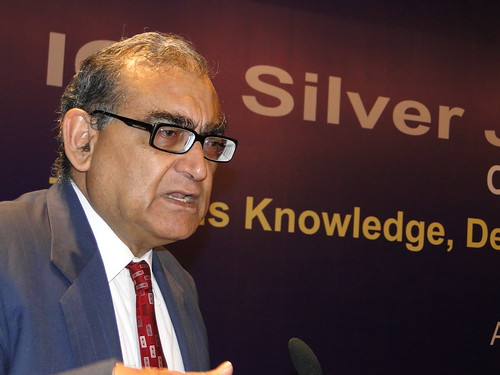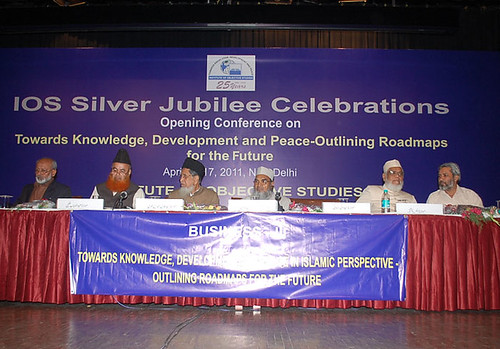By Md. Ali, TwoCircles.net,
New Delhi: Indian masses are fed on a history which selectively projects the cases of religious intolerance of Muslim rulers. Contribution of secular Muslim rulers like Tipu Sultan has deliberately been suppressed, said Justice Markanday Katju, senior judge of the highest Indian court, Supreme Court of India. He was speaking at the concluding day of a conference on “Towards Knowledge, Development and Peace – Outlining Roadmaps for the Future” organized by the Institute of Objective Studies that is celebrating its silver jubilee.
“You will get to read how Mahmood Ghaznawi demolished temples and how other Muslim rulers converted Hindus but you will never get to know that Tipu Sultan used to fund 153 temples,” added Katju who is also known for his deep interest in Urdu. Though the view has earlier been shared by secular historians and social scientists and civil society activists, it was perhaps first time that a senior most judge of the SC publicly expressed it.

Justice Markanday Katju speaking at the IOS conference
Hailing from Uttar Pradesh, Katju also gave the example of Nawab of Awadh who was known for his secular way of functioning. Katju considered this kind of “suppression of an important part of our civilization history” as the main cause of growth of communalism in India. But he also said that India is a country which is very diverse and can’t live without secularism. Calling India as the “country of migrants” Katju regarded the Indian culture as “Sanskrit–Urdu” culture.
Speaking at the occasion, Syed Shahabuddin, senior Muslim leader and intellectual lauded the efforts of the IOS for creating a platform for the social scientists, intellectuals and those from politics to come together and plan a roadmap for change. The conference concluded with the presidential speech of Dr. Manzoor Alam, chairman of the IOS.
The conference passed a resolution demanding implementation of the recommendations of the National Knowledge Commission, the Sachar Committee and Justice Ranganath Mishra Commission. It also demanded the establishment of the Equal Opportunity Commission.
The other resolutions which were passed on the occasion are as follows: –
1. The conference notes with a degree of satisfaction the rise in literacy rate as per the latest census figures but expresses its dismay on absence of enlightenment which is essential for developing a versatile personality. We do believe that though the education is spreading the world over it is not bringing refinement, broad vision, intellectual and moral richness as well as happiness in human lives. The conference urges all concerned to promote the goals of enlightenment as enshrined in the preamble of the Indian Constitution.
2. The conference resolves that the knowledge revolution will remain an empty slogan if access to knowledge remains limited to a privileged few excluding the large masses of the poor and the downtrodden. The conference also urges all concerned to give priority to the spread of education amongst minorities and the marginalized sections of the society. We, therefore, urge establishment of more and more minority institutions by the minority communities and simultaneously demand the Central and State Governments to take appropriate steps to set up adequate numbers of educational institutions of the state in the minority-concentrated areas. The conference also believes that no meaningful education would be possible without recognising due importance of primary education being imparted in the mother tongue.

3. The conference resolves that education is the key to empowerment. Knowledge alone can bring about sustainable development which must be based on generational equity and should be fully inclusive. This inclusive development, the conference, urges should be based on preservation of India’s rich diversity.
4. The conference resolves that inclusive growth is not possible without equal opportunities being given to all sections of the society particularly minorities and other marginalised communities. The conference, therefore, urges the Government of India to take immediate steps to set up an Equal Opportunity Commission.
5. The conference resolves that so long we have injustices in our society, no meaningful development or peace could be achieved and therefore to attain the lofty and cherished goal of peace through knowledge and development, we must strive to eliminate all forms of injustices and create a truly just, humane and egalitarian society. The roadmap of future in a knowledge society should, therefore, be based on expansion, inclusion and excellence.
6. The conference resolves that lasting peace can be achieved through enlightenment and knowing each other and appreciating distinctive identity of each other. The goal of attainment of peace will remain a dream till we achieve peace between and within various religions, castes, tribes and groups.
7. The conference urges the Government of India and the Government of Pakistan to release all prisoners of Pakistan and India respectively who have been falsely implicated particularly Dr. Mohammad Khaleel Chisti and Sabarjit Singh. The conference urges the use of pardoning power to ensure release of the two prisoners. The conference resolves world peace can be achieved if lasting peace is ensured in the Indian sub-continent. Release of prisoners of each other country will create most conducive environment for
peace.

